新编英语教程第五册Unit 3
新编英语教程5课文翻译(unit3)
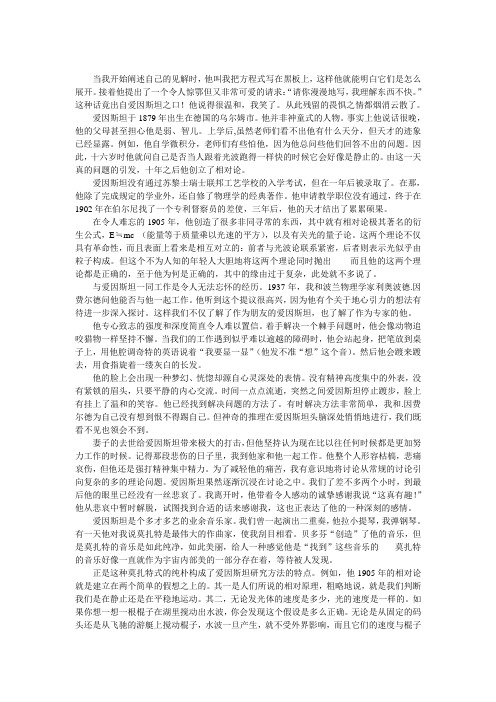
当我开始阐述自己的见解时,他叫我把方程式写在黑板上,这样他就能明白它们是怎么展开。
接着他提出了一个令人惊鄂但又非常可爱的请求:“请你漫漫地写,我理解东西不快。
”这种话竟出自爱因斯坦之口!他说得很温和,我笑了。
从此残留的畏惧之情都烟消云散了。
爱因斯坦于1879年出生在德国的乌尔姆市。
他并非神童式的人物。
事实上他说话很晚,他的父母甚至担心他是弱、智儿。
上学后,虽然老师们看不出他有什么天分,但天才的迹象已经显露。
例如,他自学微积分,老师们有些怕他,因为他总问些他们回答不出的问题。
因此,十六岁时他就问自己是否当人跟着光波跑得一样快的时候它会好像是静止的。
由这一天真的问题的引发,十年之后他创立了相对论。
爱因斯坦没有通过苏黎士瑞士联邦工艺学校的入学考试,但在一年后被录取了。
在那,他除了完成规定的学业外,还自修了物理学的经典著作。
他申请教学职位没有通过,终于在1902年在伯尔尼找了一个专利督察员的差使,三年后,他的天才结出了累累硕果。
在令人难忘的1905年,他创造了很多非同寻常的东西,其中就有相对论极其著名的衍生公式,E≒mc (能量等于质量乘以光速的平方),以及有关光的量子论。
这两个理论不仅具有革命性,而且表面上看来是相互对立的:前者与光波论联系紧密,后者则表示光似乎由粒子构成。
但这个不为人知的年轻人大胆地将这两个理论同时抛出----- 而且他的这两个理论都是正确的,至于他为何是正确的,其中的缘由过于复杂,此处就不多说了。
与爱因斯坦一同工作是令人无法忘怀的经历。
1937年,我和波兰物理学家利奥波德.因费尔德问他能否与他一起工作。
他听到这个提议很高兴,因为他有个关于地心引力的想法有待进一步深入探讨。
这样我们不仅了解了作为朋友的爱因斯坦,也了解了作为专家的他。
他专心致志的强度和深度简直令人难以置信。
着手解决一个棘手问题时,他会像动物追咬猎物一样坚持不懈。
当我们的工作遇到似乎难以逾越的障碍时,他会站起身,把笔放到桌子上,用他腔调奇特的英语说着“我要显一显”(他发不准“想”这个音)。
李观仪《新编英语教程》第5册 UNIT3
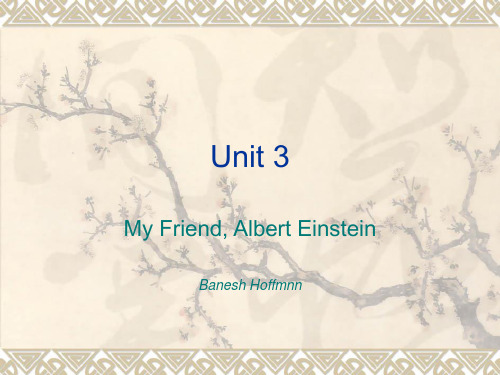
3. Ludwig van Beethoven (1770 – 1827), German composer, was one of music‟s greatest geniuses. His works have a rare originality, emotional depth, and expressive power. He was known for his nine symphonies, piano concertos and sonatas, and string quartets. Most of Beethoven‟s compositions were written in the classical forms established by his predecessors Mozart and Haydn, so he is sometimes considered the last great composer in the classical tradition. But he also remoulded and expanded the old forms and infused them with highly personal intensity of emotion, so he is also referred to as the first of the Romantics.
5. The Nazis Nazism is a political doctrine of racial supremacy, nationalism, and dictatorship. Nazi is an abbreviated form of the German words for National Socialism. It was Adolf Hitler, a member of national Socialist German Workers‟ Party, who developed the programme for Nazism in his book Mein Kampf (1925 – 1927 My Battle). He defined the Germanic peoples as race, called Aryans, superior to other races. He blamed Germany‟s troubles on Jewish capitalism, communism, and the heavy reparation payments Germany was required to make to the victorious Allies by the Treaty of Versailles (June 28, 1919) that ended the First World Warard Nobel (1833 – 1896), a distinguished Swedish chemist and industrialist, provided for the award of the Nobel prizes. He experimented with different kinds of explosives such as nitroglycerin and dynamite, both deadly explosives. However, he was a pacifist and he feared that his inventions might further warfare. In his will he left about $9,000,000,00 in a fund to reward those who did most for their fellow men in science, literature, and peace. In his will, he specified that the interest accrued by the fund “be annually distributed in the form of prizes to those who during the preceding year, shall have conferred the greatest benefit on mankind” in the field of physics, chemistry, physiology or medicine, literature, and peace, regardless of nationality.
新编英语教程(第三版)第5册 Unit 1

Paragraph 1
E.g. He slammed the door and drove the bolt home. 他砰地关上门,把门闩插好。 drive one’s point home 讲清楚自己的观
点
a voice that drives home each word 字
字清晰的说话声
II. Organization of the Text
II. Presentation of evidence (Paragraphs 4-10) 1. Semantic differences between words having the same root (Paragraphs 4-7) 2. Wrong choice of words caused by failure to recognize their connotations (Paragraph 8)
Paragraph 1
To drive home his policy, the president wrote his second letter.总统为了阐明自己
的政策,又写了第二封信。
You must drive it home to John that we don’t have enough money. 你必须使约
II. Organization of the Text
3. Stylistic differences between synonyms (Paragraph 9) 4. The abundance of specific words in English for general notions (Paragraph 10)
综合英语教程(第三版)5电子教案unit3part1

that had crawled all the way up from Miramar and lay in wait for us somewhere in a deep pool of the arroyo – a monster no less real because he lived only in our imagination. 4 When the older boys of the village came to the pond on Sunday afternoons we watched them swim and dive. From a high branch of the big nogal they dropped a swing made of bush vines we called liana, braided like the women of the pueblo3 did their hair. The boy who was to dive next waited up in the nogal.
Comprehension questions
1. In what way is the village Jalcocotan an easy place for cபைடு நூலகம்ildren to live?
2. What are the examples of children’s easy and carefree lives?
EDUCATION
POSITION Report
Advanced English 5
新编英语教程5,unit3知识点
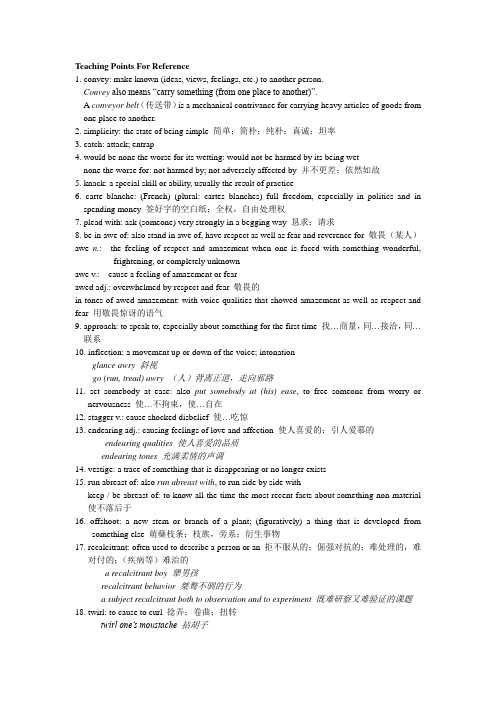
Teaching Points For Reference1. convey: make known (ideas, views, feelings, etc.) to another person.Convey also means “carry something (from one place to another)”.A conveyor belt(传送带)is a mechanical contrivance for carrying heavy articles of goods from one place to another.2. simplicity: the state of being simple 简单;简朴;纯朴;真诚;坦率3. catch: attack; entrap4. would be none the worse for its wetting: would not be harmed by its being wetnone the worse for: not harmed by; not adversely affected by 并不更差;依然如故5. knack: a special skill or ability, usually the result of practice6. carte blanche: (French) (plural: cartes blanches) full freedom, especially in politics and in spending money 签好字的空白纸;全权,自由处理权7. plead with: ask (someone) very strongly in a begging way 恳求;请求8. be in awe of: also stand in awe of, have respect as well as fear and reverence for 敬畏(某人)awe n.: the feeling of respect and amazement when one is faced with something wonderful, frightening, or completely unknownawe v.: cause a feeling of amazement or fearawed adj.: overwhelmed by respect and fear 敬畏的in tones of awed amazement: with voice qualities that showed amazement as well as respect and fear 用敬畏惊讶的语气9. approach: to speak to, especially about something for the first time 找…商量,同…接洽,同…联系10. inflection: a movement up or down of the voice; intonationglance awry 斜视go (run, tread) awry (人)背离正道,走向邪路11. set somebody at ease: also put somebody at (his) ease, to free someone from worry ornervousness 使…不拘束,使…自在12. stagger v.: cause shocked disbelief 使…吃惊13. endearing adj.: causing feelings of love and affection 使人喜爱的;引人爱慕的endearing qualities 使人喜爱的品质endearing tones 充满柔情的声调14. vestige: a trace of something that is disappearing or no longer exists15. run abreast of: also run abreast with, to run side by side withkeep / be abreast of: to know all the time the most recent facts about something non-material 使不落后于16. offshoot: a new stem or branch of a plant; (figuratively) a thing that is developed fromsomething else 萌蘖枝条;枝族,旁系;衍生事物17. recalcitrant: often used to describe a person or an 拒不服从的;倔强对抗的;难处理的,难对付的;(疾病等)难治的a recalcitrant boy 犟男孩recalcitrant behavior 桀骜不驯的行为a subject recalcitrant both to observation and to experiment 既难研察又难验证的课题18. twirl: to cause to curl 捻弄;卷曲;扭转twirl one’s moustache 拈胡子19. furrow: make deep lines or folds in the skin of the face, especially the forehead20. placid: calm; peaceful 宁静的;平静的;平和的;温和的21. fathom: come to understand; get the true meaning offathom somebody’s moti ves (mystery) 弄清某人的动机(秘密)a man hard to fathom 难以捉摸的人I can’t fathom what you mean. 我不能完全猜透你的意思。
(完整版)新编英语教程5册Unit1的答案
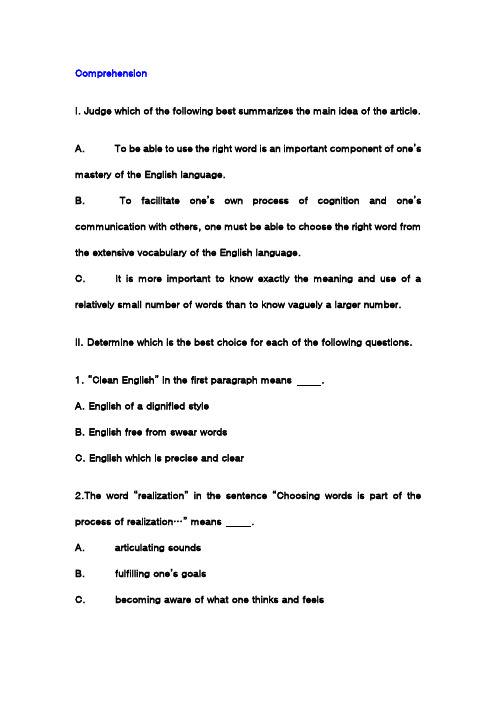
ComprehensionI. Judge which of the following best summarizes the main idea of the article.A. To be able to use the right word is an important component of one’s mastery of the English language.B. To facilitate one’s own process of cognition and one’s communication with others, one must be able to choose the right word from the extensive vocabulary of the English language.C. It is more important to know exactly the meaning and use of a relatively small number of words than to know vaguely a larger number.II. Determine which is the best choice for each of the following questions.1. “Clean English” in the first paragraph means .A. English of a dignified styleB. English free from swear wordsC. English which is precise and clear2.The word “realization” in the sentence “Choosing words is part of the process of realization…” means .A. articulating soundsB. fulfilling one’s goalsC. becoming aware of what one thinks and feels3. The example given in para. 3 of a man searching for the right word for his feelings about his friend illustrates the function words perform in .A. defining out thoughts and feelings for ourselvesB. defining our thoughts and feelings for those who hear usC. both A and B4. The word “cleanly” in the last sentence means .A. squarelyB. clearlyC. neatly5.The examples of the untranslatability of some words given in para. 11 best illustrate which sentence of the paragraph?A. The first sentence.B. The second sentence.C. The third sentence.III. Answer the following questions.1. Which sentence in the first paragraph establishes the link between the driving of a nail and the choice of a word?2. What does the word “this” in sent ence 1, para. 2, refer to?3. Do you agree with the author that there is a great deal of truth in the seemingly stupid question “How can I know what I think till I see what I say”?Why or why not?4. Explain why the word “imprison” in the example given in para. 9, though not a malapropism, is still not the right word for the writer’s purpose.5. What is the difference between “human” and “humane”? And the difference between “human action” and “humane action”, and also that between “human killer” and “humane killer”?6. What does the word “alive” in the sentence “a student needs to be alive to these differences” (para. 9) mean?7. Why is it difficult and sometimes even impossible to translate a word from one language into another as illustrated in para. 11? Supply some such examples with English and Chinese.8. The writer begins his article with an analogy between the unskilled use of the hammer and the improper choice of words. Identify the places where the analogy is referred to in the rest of the article.Language WorkI. Read the following list of words and consider carefully the meaning of each word. Then complete each of the sentences below using the correct form of an appropriate word from the list.Creep Loiter March Meander Pace Patrol Plod Prowl Ramble Roam SaunterShuffle Stagger Stalk Step Stride Strut Stroll Toddle Tramp Tread Trudge Walk1. After the maths examination Fred, feeling exhausted, across the campus.2. The soldiers reached their camp after 15 miles through the deep snow.3. It is pleasant to in the park in the evening.4. After the cross-country race Jack to the changing room.5. Last night when he sleepily to the ringing telephone, he accidentally bumped into the wardrobe.6. We saw him towards the station a few minutes before the train’s departure.7. The old couple through the park, looking for a secluded bench to sit on and rest.8. The newly-appointed general about the room like a latter-day Napoleon.9. Peter whistled happily as he along the beach.10. These old people liked to about the antique ruins in search of a shady picnic spot.11. Many tourists about the mall, windowshopping.12. We were fascinated by the view outside the room----a beautiful verdant meadow and brooks through it.13. Mary used to about the hills and pick wild flowers for her mother.14. Eager to see the pony in the stable, the children down the staircase, their hearts pounding violently.15. The lion had the jungle for a long time before it caught sight of a hare.16. My brother began to when he was ten months old.17. The farmers often let their horses freely in the meadow so that they could eat their fill of grass.18. The patrols were along through the undergrowth when the bomb exploded.19. The thugs were reported to be the streets for women workers who were on their way home after the afternoon shift.20. The first-year students not only learned how to , they were also taught how to take aim and shoot when they had military training.21. Sometimes Tom, our reporter, would up and down the study, deep in thought.22. When he was Third Street, Fred found the little match girl lying dead at the street corner.23. Secretaries hated seeing their new manager in and out of theoffice without even casting a glance at them.24. Mother asked us to lightly so as not to wake Granny.25. The refugees for miles and miles all day hunting for a place to work.26. When the pop singer out of the car, his fans ran to him, eager to get his autograph.27. The laborers on their way home after working in the plantation the whole day.28.The lion was feeling pretty good as he (A) through the jungle. Seeing a tiger, the lion stopped it.“Who is the King of the jungle?” the lion demanded.“You, O lion, are the King of the jungle,” replied the tiger.Satisfied, the lion (B) on, until he came across a large, ferocious-looking leopard.“Who is the King of the jungle?” asked the lion, and the leopard bowed in awe. “You, mighty lion, you are the King of the jungle,” it said humbly and (C) off.Feeling on top of the world, the lion proudly (D) up to a huge elephant an d asked the same question. “Who is the King of the jungle?”Without answering, the elephant picked up the lion, swirled him round in the air, smashed him to the ground and jumped on him.“Look,” said the lion, “there’s no need to get mad just because you didn’t know the answer.”II. Make a list of more specific words for each of the following general terms. For example, for WALK, you could list stride, stroll, saunter, plod, toddle and so on. Give sentences to illustrate how the words may be used.1. SAY2. SEE3. BEVERAGE4. EXCITEMENT5. DELIGHT6. SKILFULIII. In the following sentences three alternatives are given in parentheses for the italicized words. Select the one which you think is most suitable in the context.1. A clumsy (heavy, stupid, unskillful) workman is likely to find fault with his tools.2. As John was a deft (skillful, clever, ready) mechanic, he was hired by the joint-venture in no time.3. The writer made a point of avoiding using loose(vague, unbound, disengaged) terminology in his science fiction.4. We didn’t appreciate his subtle(delicate, tricky, profound) scheme to make money at the expense of the customers.5. Annie Oakley became famous as one of the world’s most precise (accurate, scrupulous, rigid) sharpshooters.6. The government in that newly-independent country has decided to make ashift (alteration, turn, transference) in its foreign policies.7. Misunderstanding arose on account of the vague(undetermined, confused, ambiguous) instructions on the part of the manager.8. If soldiers do not pay scrupulous (exact, vigilant, conscientious) attention to orders they will not defeat the enemy.9. In some areas, the virgin forest has been cut through ignorance (blindness, want of knowledge, darkness) of the value of trees.10. Since many pure metals have such disadvantages (harm, unfavourableness, drawbacks) as being too soft and being liable to rust too easily, they have little use.11. My colleague, Mr. Hill, has a small but well-chosen library, where it is said he spends most of his spare time cultivating(nourishing, tilling, developing) his mind.12. If you think photography is my hobby, your belief is quite mistaken (fraudulent, erroneous, deceitful).13. What appears to the laymen as unimportant (minute, trivial, diminutive) and unrelated facts is often precious to the archaeologist.14. The lounge has a seating capacity of 30 people but it is too dark (dim, dingy, gloomy) to read there.15. These career-oriented women are used to flexible (adaptable, willowy, docile) working hours in the office.16. Only experts with a professional eye can tell the fine(fair, pleasant,subtle) distinction between the two gems.17. The goose quill pen has a great sentimental (tender, emotional, soft) appeal to Emily as it was a gift from her best friend.18. Being thoughtful of and enthusiastic towards others is the essence (gist, kernel, quintessence) of politeness.19. When Iraq destroyed some of its nuclear and chemical weapons, it acted under coercion (repression, concession, compulsion).20. My uncle’s oft-repeated anecdotes of his adventures in Africa were fascinating (catching, pleasing, absorbing ) to listen to.IV. Give one generic term that covers each of the following groups of words.1. artificer, turner, joiner, carpenter, weaver, binder, potter, paper-cutter2. volume, brochure, pamphlet, treatise, handbook, manual, textbook, booklet3. painter, sculptor, carver, poet, novelist, musician, sketcher4. grin, smirk, beam, simper5. donation, subscription, alms, grant, endowment6. bandit, poacher, swindler, fraud, embezzler, imposter, smuggler7. nibble, munch, devour, gulp8. drowse, doze, slumber, hibernate, coma, rest, nap9. manufacture, construct, weave, compose, compile10. ancient, antique, old-fashioned, obsolete, archaic11. slap, tap, pat, thump, whack12. alight, descend, dismount, disembarkV. Fill in each blank with an appropriate word.In discussing the relative difficulties of analysis which the exact and inexact sciences face, let me begin with an analogy. Would you agree that swimmers are (1) skilful athletes than runners (2) swimmers do not move as fast as runners? You probably would (3) . You would quickly point out (4) water offers greater (5) to swimmers than the air and ground do to (6) Agreed, that is just the point. In seeking to (7) their problems, the social scientists encounter (8) resistance than the physical scientists. By (9) I do not mean to belittle the great accomplishments of physical scientists who have been able, for example, to determine the structure of the atom (10) seeing it. That is a tremendous (11) yet (12) many ways it is not so difficult as what the social scientists are expected to (13) . The conditions under which the social scientists must work would drive a (14) scientist frantic. Here are five of (15) conditions. He can perform (16) experiments; he cannot measure the results accurately; he (17) control the conditions surrounding (18) experiments; he is of the expected to get quick results(19) slow-acting economic forces; and he must work with people,(20) with inanimate objects…VI. Following Warner’s model of establishing an analogy between two dissimilar things, write a passage, discussing the learning of a foreign language. You are supposed to use an analogy to help you explain. For instance, you may compare the learning of a foreign language to that of swimming, bike-riding, etc.UNIT 1 TEXT 1Exercises KeysComprehension:I. B ;II. 1.C 2.C 3.C 4.A 5.C ;III. 1. “So with language; …firmly and exactly.”2. Getting the word that is completely right for the writer’s purpose.3. Yes, I do. It sounds irrational that a person does not know what he himself thinks before he sees what he says. But as a matter of fact, it is quite true that unless we have found the exact words to verbalize our own thoughts we can never be very sure of what our thoughts are; without words, our thoughts cannot be defined or stated in a clear and precise manner.4. “Malapropism” means the unintentional misuse of a word by confusing it with one that resembles it, such as human for humane, singularity for singleness. But the misuse of “imprison” is a different case. It is wronglychosen because the user has failed to recognize its connotation.5. human=of, characterizing, or relating to manhumane=characterized by kindness, mercy, sympathyThus: human action=action taken by man; humane action=merciful action; human killer=person that kills humans ; humane killer=that which kills but causes little pain6. sensitive, alert7. Those are words denoting notions which are existent only in specific culture, not universally shared by all cultures. English words difficult to be turned into Chinese: privacy, party, lobby (v.), etc. Chinese words difficult to be turned into English: 吹风会,粽子,五保户,etc.8. “We don’t have to look far afield to find evidence of bad carpentry.”“It is perhaps easier to be a good craftsman with wood and nails than a good craftsman with word s.”“A good carpenter is not distinguished by the number of his tools, but by the craftsmanship with which he uses them. So a good writer is not measured by the extent of his vocabulary, but by his skill in finding the ‘mot juste’, the word that will hit t he nail cleanly on the head.”Language Work:I. 1. shuffled/trudged 2. trudging 3. stroll 4. staggered 5. staggered 6. striding 7. strolled 8. strutted 9. sauntered/strolled 10. ramble/roam 11.loitered 12. meandering 13. roam 14. crept 15. prowled 16. toddle 17. roam 18. creeping 19. prowling 20. march 21. pace 22. patrolling 23. stalking 24. tread 25. tramped 26. stepped 27. plodded 28. A. prowled/strutted B. strolled/sauntered C. walked/crept D. marched/struttedII.1.SAY: speak, tell, declare, pronounce, express, state, argue, affirm, mention, allege, recite, repeat, rehearse2. SEE: behold, look at, glimpse, glance at, view, survey, contemplate, perceive, notice, observe, discern, distinguish, remark, comprehend, understand, know3. BEVERAGE: liquor, wine, beer, tea, coffee, milk drink, soft drink4. EXCITEMENT: agitation, perturbation, commotion, disturbance, tension, bustle, stir, flutter, sensation5. DELIGHT: joy, gladness, satisfaction, charm, rapture, ecstasy, pleasure, gratification6. SKILFUL: apt, ingenious, handy, ready, quick, smart, expert, capable, able, gifted, talented, dexterous, cleverIII. 1. clumsy----unskillful 2. deft----skillful 3. loose----vague 4. subtle----tricky 5. precise----accurate 6. shift----alteration 7. vague----ambiguous8. scrupulous----conscientious 9. ignorance----want of knowledge 10. disadvantages----drawbacks 11. cultivation----developing 12.mistaken----erroneous 13. unimportant----trivial 14. dark----dim 15. flexible----adaptable 16. fine----subtle 17. sentimental----emotional 18. essence----quintessence 19. coercion----compulsion 20. fascinating----absorbingIV. 1. craftsman 2. book/publication 3. artist 4. smile 5. contribution 6. law-breaker 7. eat 8. sleep 9. make 10. old 11. hit 12. get offV. 1. less 2. because/since/as 3. not 4. that 5. resistance 6. runners 7. solve 8. greater/more 9. that 10. without 11. achievement/feat 12. in 13. do 14. physical 15. those 16. few 17. cannot 18. the 19. with 20. not。
新编英语教程5(词汇Unit1-10)
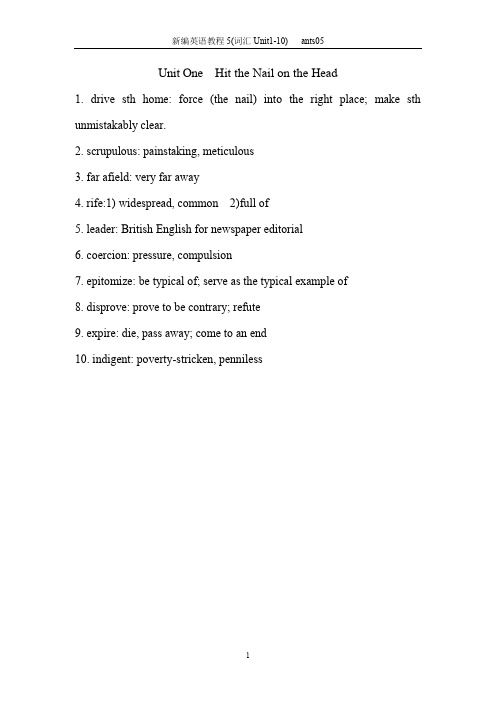
Unit One Hit the Nail on the Head1. drive sth home: force (the nail) into the right place; make sth unmistakably clear.2. scrupulous: painstaking, meticulous3. far afield: very far away4. rife:1) widespread, common 2)full of5. leader: British English for newspaper editorial6. coercion: pressure, compulsion7. epitomize: be typical of; serve as the typical example of8. disprove: prove to be contrary; refute9. expire: die, pass away; come to an end10. indigent: poverty-stricken, pennilessUnit Two Beware the dirty seas1. sluice: (v.) to pour as if from a sluice(水闸),i.e., a man-made passage for water fitted with a gate for stopping and regulating the flow; (n.) a channel controlling water flow2. nurture: further the development of; care for3. evolve: develop gradually (by a long continuous process)4. endemic: (of a disease) found regularly in a particular place5. litany: repetition. The literal meaning of “litany” is “a prayer consisting of a series of invocations and supplications by the leader with responses by the congregation”.6. flush: pour; flood with water to clean out (See dictionary)7. lurk: exist unseen8. effluent: liquid wastes, such as chemicals or sewage that flows out from a factory or some other places into a river or the sea9. plankton: very small forms of plant and animal life that live in a body off water 浮游生物10. slime: unpleasant sticky substance, such as the thick sticky liquid on the skin of various fishUnit Three My Friend, Albert Einstein1. knack: a clever way of doing things2. be in awe of: have respect as well as fear and reverence for3. staggering: unexpectedly surprising; astounding4. vestiges: traces5. ultimately: finally; after a long series of time6. recalcitrant: hard to deal with; unmanageable7. worry: assail a problem again and again until it is solved, just like a dog biting some small animals repeatedly, shaking it or pulling it with the teeth8. surcease: (archaic) cessation, pause9. plausible: seeming to be reasonable10. a house of cards: an insecure scheme11. ineffable: unutterable; incapable of being expressed in words12. elusively whimsical: indescribably quaint or strange 捉摸不透的,古怪Unit Four The Invisible Poor1. perennial: lasting forever or for a long time2. rutted roads: roads with deep, narrow marks made by the wheels of vehicles3. be exempt from: be freed from a duty. service, payment, etc.4. tenement: a large building, especially one in the poor part of a city, which is divided into small flats which are rented cheaply5. affluent: wealthy, prosperous6. compound v.: /kom'paund/ make worse by adding (something) to . . . (often used in the passive)7. existential: relating to human experience (a formal-word)8. lurid: sensational, shocking9. dispossessed: people who have lost all their possessions10. cynical: doubtful as to whether something will happen or whether it is worthwhile11. involvement: connection12. old rhetoric of reform: writings about reform in the past that sounded fine and important, but were really insincere and meaninglessUnit Five The Plug—in Drug:TV and the American Family,PartⅠ1. afflict: trouble2. asset: valuable object; advantage3. preposterous: unthinkable, absurd4. splintering: splitting, breaking up5. the peer group: a group of people of the same age, class, position. etc. here, group of children of the same age6. television-oriented: interested in and influenced by TV7. equivocal: ambiguous8. sorcerer: person who performs magic by using the power of evil spirits9. stint: fixed amount of work: here, the fixed TV programme10. conjure up: bring into the mind11. sane: (in this context) in possession of good relations/of a close bond12. backlog: a reserveUnit Six Preparing for College1. driving motive: the incentive / encouragement that urges them on;2. the rudiments: the basics, the fundamentals (The word rudiments is always in the plural form when used in this sense.)3. metaphysics: the branch of philosophy that deals with abstract concepts, etc. 形而上学,玄学,纯粹哲学4. conscious culture: the culture (i.e. customs, arts, etc,) that is directly perceptible or known to us5. fanatic: one who is very enthusiastic about a particular activity6. personify: express or represent ( a quality in human form)7. sedentary: inactive; done while sitting down8. underline: indicate the importance of9. balked: baffled; frustrated10. a maddening lot: a wild, uncontrollable group11. righteous sects: morally justifiable groups of people whose religious beliefs are considered different form those of a larger group12. relish: 味,味道,兴趣;开胃小菜;great enjoymentUnit Seven Grouping the Gifted:Pro1. innate: belonging to an individual from birth2. pursuit: an activity that one engages in as a profession, vocation, or avocation3. athlete: person who practises athletics; competitor or skilled performer in physical exercises4. heterogeneously: in such a way that members are very different from one another5. criterion /--ia: standard on which a decision may be based6. snob: one who has an offensive air of superiority (here, in matters of knowledge)7. elite: a socially superior group8. instill: put (ideas, etc. ) gradually but firmly into someone's mind by continuous effort9. spark: encourage; stimulate into greater activity10. latent: present and capable of becoming though not now visible or active11. skyrocket: rise or increase rapidly12. pay dividends: produce an advantage. especially as a result of an earlier action (dividend: that part of the money made by a business which is divided among those who own shares in the business 红利)Unit Eight Why Nothing Works1. savant: a man of learning, especially a person with detailed knowledge in some specialized field2. corollary: an immediate inference from a proved proposition3. forestall: defeat, prevent by prior measures4. commitment: a pledge to follow certain beliefs or a certain course of action; devotion (to duty etc. )5. artifact: a usually small object (as a tool or an ornament) showing human workmanship that has special historical interest6. evoke: bring to mind7. projectile point: the tip of a weapon that is thrust forward; spear or arrowhead8. band: a group of people formed for some common purpose and often with a leader9. barter: trade by exchanging one commodity for another10. alienation: a withdrawing or separation of a person from an object or position of former attachment; a feeling of not belonging to or being part of one's surroundingsUnit Nine Where Is the News Leading Us?1. symposium: a conference in which experts or scholars discuss a certain subject2. scrutinize: examine very closely and carefully3. distortion: misrepresentation; a false or dishonest account4. eruptive: (in this context) sensational, shocking, disturbing5. collide with: crash violently into; run into (one another)6. ingredient: a component part of something7. inhibitor: one who holds back, prevents8. deplete: exhaust, use up, reduce9. cynicism: disbelief in the sincerity of human motives10. antidote: remedy, corrective; something that prevents or counteracts11. envision: picture mentally, imagine, visualize12. caricature: a picture ludicrously滑稽的exaggerating the peculiarities or defects of persons or thingsUnit Ten Things:The Throw—Away Society1. Humanoid: having human form or characteristics2. texture: the degree of roughness or smoothness, coarseness or fineness, of a substance or material, especially as felt by touch; visual and tactile qualities of a surface3. staggering: stunning, wondrous, breathtaking4. deride: laugh at contemptuously; to scoff at or mock5. transience: temporariness, impermanence; the quality or state of being temporary or impermanent6. at a rapid clip: (informal) at a fast pace7. inextricably embedded: so deeply involved that it is impossible to get free8. boutique: a small fashionable clothes shop9. sumptuous: expensive and grand10. train: a part of a long dress that spreads over the ground behind the wearer11. A-line dresses: dresses with a flared bottom and close-fitting top, having an "A" or tent-like shape12. supplant: take the place of; replace。
Unit 3 Lying全新版大学英语综合教程五教案
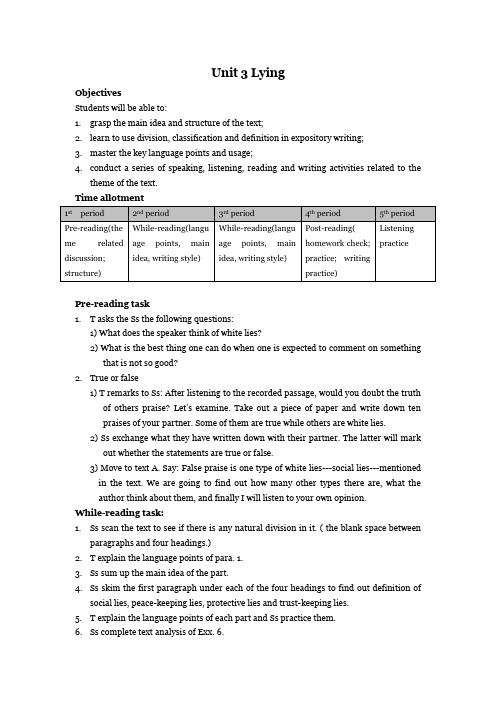
Unit 3 LyingObjectivesStudents will be able to:1.grasp the main idea and structure of the text;2.learn to use division, classification and definition in expository writing;3.master the key language points and usage;4.conduct a series of speaking, listening, reading and writing activities related to thetheme of the text.Time allotmentPre-reading task1.T asks the Ss the following questions:1) What does the speaker think of white lies?2) What is the best thing one can do when one is expected to comment on somethingthat is not so good?2.True or false1) T remarks to Ss: After listening to the recorded passage, would you doubt the truthof others praise? Let’s examine. Take out a piece of paper and write down ten praises of your partner. Some of them are true while others are white lies.2) Ss exchange what they have written down with their partner. The latter will markout whether the statements are true or false.3) Move to text A. Say: False praise is one type of white lies---social lies---mentionedin the text. We are going to find out how many other types there are, what the author think about them, and finally I will listen to your own opinion.While-reading task:1.Ss scan the text to see if there is any natural division in it. ( the blank space betweenparagraphs and four headings.)2.T explain the language points of para. 1.3.Ss sum up the main idea of the part.4.Ss skim the first paragraph under each of the four headings to find out definition ofsocial lies, peace-keeping lies, protective lies and trust-keeping lies.5.T explain the language points of each part and Ss practice them.6.Ss complete text analysis of Exx. 6.Post-reading task1.Group discussion: interview your partner’s opinion to this four type of lies.2.T guide the Ss to complete the after-text exercises.3.Write an essay according to the requirement of Theme-related Language LearningTask.Text A The truth about LyingI.Cultural BackgroundWatergate Scandal“Watergate” is a general term used to describe a compl ex web of political scandals between 1972 and 1974. The word specifically refers to the Watergate Hotel, one of the plushest hotels in Washington D.C."Watergate" has entered the political lexicon as a term synonymous with corruption and scandal. It was here that the Watergate Burglars broke into the Democratic Party's National Committee offices on June 17, 1972.The story of Watergate has an intriguing historical and political background, arising out of political events of the 1960s. But the chronology of the scandal really begins during 1972, when the burglars were arrested. By 1973, Richard Nixon had been re-elected President, but the storm clouds were building. By early 1974, the nation was consumed by Watergate. Nixon made three major speeches on the Watergate scandal during 1973 and 1974.Political investigations began in February 1973 when the Senate established a Committee to investigate the Watergate scandal. The Committee uncovered the existence of the secret White House tape recordings, sparking a major political and legal battle between the Congress and the President.In 1974, the House of Representatives authorized the Judiciary Committee to consider impeachment proceedings against Nixon. Nixon's last days in office came in late July and early August, 1974. The House Judiciary Committee voted to accept three of four proposed Articles of Impeachment of the President.The final blow came with the decision by the Supreme Court to order Nixon to release more White House tapes. Around the country, there were calls for Nixon to resign.At 9 pm on the evening of August 8, 1974, Nixon delivered a nationally televised resignation speech. The next morning, he made his final remarks to the White House staff before sending his resignation letter to the Secretary of State, Dr. Henry Kissinger.The Watergate brought down Richard Nixon, and had profound consequences in the United States.Nixon died in 1994 and was eulogized by the political establishment, although he was still a figure of controversy.Part Division of the text:Part one: The reason why the writer finds it difficult to write on the subject of lying and how she is going to deal with the difficulty in composing the essay.Part Two: The writer discusses four types of lies and tells us what she thinks about them respectively.Part Three: How the author feels we should cope with the question of whether or not to lie.Language Study1. intrigue--- Interest greatly; 有兴趣e.g. He’s always been intrigued by machinery. 他总是对机器很着迷。
- 1、下载文档前请自行甄别文档内容的完整性,平台不提供额外的编辑、内容补充、找答案等附加服务。
- 2、"仅部分预览"的文档,不可在线预览部分如存在完整性等问题,可反馈申请退款(可完整预览的文档不适用该条件!)。
- 3、如文档侵犯您的权益,请联系客服反馈,我们会尽快为您处理(人工客服工作时间:9:00-18:30)。
Beethoven's musical style
Beethoven was a music revolutionary giant. 贝多芬则是一位音乐的革命巨人。
Beethoven's symphonies(交响曲) is mainly written about the hero of the Revolutionary struggle(革命斗争) His music created rich and varied image, the use of each of his works in sonata(奏鸣曲) form has its own characteristics. 他创作的形象丰富多样,运用在他的每一部lso the author of The Strange Story of the Quantum, The Tyranny of Testing, About Vectors, and Relativity and Its Roots. He was a member of the Baker Street Irregulars and wrote the short story Sherlock, Shakespeare, and the Bomb, published in Ellery Queen Mystery Magazine in February 1966.
2.Beethoven in many respects directly inherited and developed the Mozart's art.
Mozart's musical style
1.Mozart is a unique prodigy in the history of music. 2.the most prominent feature of Mozart's musical style is maintaining an unmatched fluency and singing. 3.Mozart‘s piano music is full of quiet, fantasy, romance and simple,but it captures the most basic and beautiful feeling of the listener. 莫扎特是音乐史上独一无二的天才神童。 其音乐风格最突出的特点,就是保持着一种无与伦比的流畅性与 歌唱性。 他的钢琴音乐中充满了宁静,幻想,浪漫,简约却抓住了聆乐人内心 基本,最美好的感受。
He obtained his Ph.D. from University of Zurich. He later became professor at the Kaiser-Wilhelm Gesellschaft in Berlin.
Scientific Works
The 1905 papers: Three seminal papers researched and written by Einstein. The first concerning electromagnetic energy The second proposing the special theory of relativity The third concerning statistical mechanics
Birth and Childhood
• Albert was born on March 14, 1879 in Ulm, Germany. • Parents Hermann and Pauline were non observant Jews whose family business consisted of the manufacturing of electrical parts.
The house where Einstein was born.
Early Schooling
Albert received good grades but found his schooling restricting as it depended on memorization and obedience. His real studies were done at home while reading science and math textbooks. He left his school in Munich at age 15, to join his parents who had moved to Italy.
Conclusion
可以说听莫扎特的钢琴音乐时是怀着一种高尚的宁静来细细咀嚼的,仿佛 是走进了一个繁花似锦的花园,静静的享受着古典的建筑,庭中小径,月光 下的路灯,小草鲜花,清亮的流水声,漫天的星斗倒影在小池中……一曲终 了,可以怀着安逸悄然入睡。而在欣赏贝多芬的钢琴作品时心中往往是不 能平静的。如《月光》奏鸣曲中,第一乐章好象皓月当空,一派安宁景象, 第二乐章则如月映池底,波光澜澜,第三乐章是无论如何也难以让人联想到 月亮的。其急风暴雨般的演奏典型地表现出了贝多芬的风格。所以,贝多 芬和莫扎特的区别就在于两人都赐给人类美妙的音乐,可美的不一样,美的 一快,一慢;一个入世,一个出世;一个正视生活的困难,一个则用含着眼泪的 微笑面对严酷的生活。
Einstein’s class in Munich in 1889. Einstein is in the front row, second from the right.
Albert graduated from the Swiss Federal Institute of Technology in 1900 as a secondary math and physics teacher.
• 有一天他说莫扎特是所有作曲家中最伟大的一位,这让我吃惊不小。 他认为贝多芬的音乐是"创造"出来的,而莫扎特的音乐是如此纯净和 优美,让人感觉他只是在哪儿"发现"了它---它一直是宇宙内在的美的 一部分,一直存在着,等待着我们去发现。
similarity
1.Mozart, Beethoven, two belong to the Vienna classical music composers.
Nobel Prize in Physics Year: 1921 Winner: Albert Einstein Reason: Photoelectric effect 光电效应
Madame Curie
Mo Yan
Special Relativity(1905) 狭义相对论
The laws of physics are the same for all observers in uniform motion relative to one another (principle of relativity). The speed of light in a vacuum is the same for all observers, regardless of their relative motion or of the motion of the light source.
Scientific Works
E=mc² This equation expresses the deep connection between energy and mass. E represents energy, m represents mass, and c² is a very large number, the square of the speed of light.
Introduction of The Author Einstein’s Life Relevant Knowledge
Yame
Cinderella Elaine Katherine Eunice
Main Idea & Organization of The Text
Edited by Sue
Sue
Relationship with Einstein
He was a British mathematician and physicist known for his association with Albert Einstein. While at the Institute for Advanced Study in Princeton, Hoffmann collaborated with Einstein and Leopold Infeld on the classic paper Gravitational Equations and the Problem of Motion. What Einstein, Infeld, and Hoffmann showed was that the equation of motion followed directly from the field equation that defined the geometry.
Traits
Different
Curious Intelligent Musical
The contrast of Mozart and Beethoven's musical style
contrast
Evaluation of Einstein
• One day he surprised me by saying Mozart was the greatest composer of all. Beethoven "created" his music, but the music of Mozart was of such purity and beauty one felt he had merely "found" it - that it had always existed as part of the inner beauty of the Universe, waiting to be revealed.
